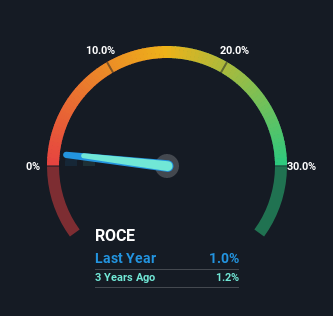- United Kingdom
- /
- Infrastructure
- /
- AIM:SUH
Sutton Harbour Group (LON:SUH) Will Be Hoping To Turn Its Returns On Capital Around
When it comes to investing, there are some useful financial metrics that can warn us when a business is potentially in trouble. A business that's potentially in decline often shows two trends, a return on capital employed (ROCE) that's declining, and a base of capital employed that's also declining. Basically the company is earning less on its investments and it is also reducing its total assets. In light of that, from a first glance at Sutton Harbour Group (LON:SUH), we've spotted some signs that it could be struggling, so let's investigate.
Return On Capital Employed (ROCE): What is it?
For those who don't know, ROCE is a measure of a company's yearly pre-tax profit (its return), relative to the capital employed in the business. To calculate this metric for Sutton Harbour Group, this is the formula:
Return on Capital Employed = Earnings Before Interest and Tax (EBIT) ÷ (Total Assets - Current Liabilities)
0.01 = UK£817k ÷ (UK£80m - UK£2.3m) (Based on the trailing twelve months to September 2021).
So, Sutton Harbour Group has an ROCE of 1.0%. Ultimately, that's a low return and it under-performs the Infrastructure industry average of 7.2%.
Check out our latest analysis for Sutton Harbour Group

While the past is not representative of the future, it can be helpful to know how a company has performed historically, which is why we have this chart above. If you want to delve into the historical earnings, revenue and cash flow of Sutton Harbour Group, check out these free graphs here.
What Can We Tell From Sutton Harbour Group's ROCE Trend?
In terms of Sutton Harbour Group's historical ROCE movements, the trend doesn't inspire confidence. Unfortunately the returns on capital have diminished from the 1.8% that they were earning five years ago. And on the capital employed front, the business is utilizing roughly the same amount of capital as it was back then. This combination can be indicative of a mature business that still has areas to deploy capital, but the returns received aren't as high due potentially to new competition or smaller margins. If these trends continue, we wouldn't expect Sutton Harbour Group to turn into a multi-bagger.
The Key Takeaway
In summary, it's unfortunate that Sutton Harbour Group is generating lower returns from the same amount of capital. Long term shareholders who've owned the stock over the last five years have experienced a 29% depreciation in their investment, so it appears the market might not like these trends either. With underlying trends that aren't great in these areas, we'd consider looking elsewhere.
One final note, you should learn about the 4 warning signs we've spotted with Sutton Harbour Group (including 1 which doesn't sit too well with us) .
If you want to search for solid companies with great earnings, check out this free list of companies with good balance sheets and impressive returns on equity.
New: Manage All Your Stock Portfolios in One Place
We've created the ultimate portfolio companion for stock investors, and it's free.
• Connect an unlimited number of Portfolios and see your total in one currency
• Be alerted to new Warning Signs or Risks via email or mobile
• Track the Fair Value of your stocks
Have feedback on this article? Concerned about the content? Get in touch with us directly. Alternatively, email editorial-team (at) simplywallst.com.
This article by Simply Wall St is general in nature. We provide commentary based on historical data and analyst forecasts only using an unbiased methodology and our articles are not intended to be financial advice. It does not constitute a recommendation to buy or sell any stock, and does not take account of your objectives, or your financial situation. We aim to bring you long-term focused analysis driven by fundamental data. Note that our analysis may not factor in the latest price-sensitive company announcements or qualitative material. Simply Wall St has no position in any stocks mentioned.
About AIM:SUH
Sutton Harbour Group
Engages in the provision of harbour and its ancillary facilities in the United Kingdom.
Low risk and overvalued.
Market Insights
Community Narratives




